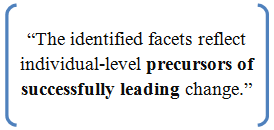Making Change Happen: Part 1 of 4
Part One: Facets of Effective Change Leadership
It’s 2013 and change is in the air. This week, we seize the opportunity to bring you articles on change competency, change readiness, and barriers to change that leaders may face. Kicking off the series is “An In-Depth View of the Facets, Antecedents, and Effects of Leaders’ Change Competency: Lessons From a Case Study,” published by Stefan Krummaker of the University of East Anglia and Bernd Vogel of the University of Reading on December 16, 2012 in the Journal of Applied Behavioral Science’s OnlineFirst section. Dr. Krummaker and Dr. Vogel kindly provided the following responses about the article:
What inspired you to be interested in this topic?
We wanted to learn more about the competences “behind” successful leadership behaviour. From research on leadership competencies we already knew that competences are not just a collection of skills, but a combination of abilities and willingness/readiness to enact these abilities in a specific context. Thus, we wanted to a) identify facets of leader’s change competency (i.e. the ability and readiness for change)  b) explore what factors are acting as influencing factors/antecedents of leader’s change competence c) learn about the consequences of leader’s change competency are and d) to integrate our findings in a first model of leader’s change competency.
b) explore what factors are acting as influencing factors/antecedents of leader’s change competence c) learn about the consequences of leader’s change competency are and d) to integrate our findings in a first model of leader’s change competency.
Were there findings that were surprising to you?
It was interesting to see that leader’s change competency is not only influenced by what we call competency potentials (leader characteristics) and contextual factors such as the support of supervisors and the perceived benefits of the change for the company, but also by the leader’s “attitude towards the change” which is comprised by the leader’s emotions about the change (e.g. enthusiasm) and thinking (e.g. I am doing something meaningful, I have impact…). Thus, the emergence of a leader’s change competence seems to be a more complex process than we have expected.
How do you see this study influencing future research and/or practice?
Having a first idea of the facets, influencing factors and effects of leader’s change competency, we are now interested to learn more about the generalisability of the concept. Does is differ in/for different change settings, industry of hierarchical levels? Also, we are curious to see how the concept can be tested in a quantitative setting and if our propositions will hold or will be challenged. For our practical work with leaders in MBA programmes and company trainings, we are interested in discussing our findings and to learn more about what this means for particpants’ leadership activities in change. Also, we are thinking about designing training programmes which include a self-reflection on and self-development of leaders’ change competence as well as strategies how leaders can increase the level of their followers change competence.
Dr. Stefan Krummaker is Senior Lecturer (Associated Professor rank) in Organisational Behaviour and Associated Director of Enterprise and Engagement at the University of East Anglia’s London Business School (UEA London). He received his Ph.D. from the Leibniz University of Hannover. His research interests include leadership, followership, leader-follower relationship building and academic-practitioner collaborative research.
Dr. Bernd Vogel is an Associate Professor of Leadership and Organizational Behaviour at the Henley Business School, University of Reading, UK. He received his PhD from the Leibniz University of Hannover. His research interests include leadership, followership, co-creation of leadership, organizational energy, and emotions in organizations.
Click here to read the article and here to sign up for e-alerts so you don’t miss future research from the Journal of Applied Behavioral Science.




























































































